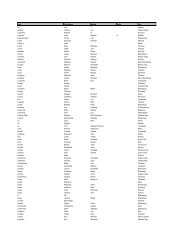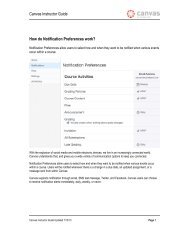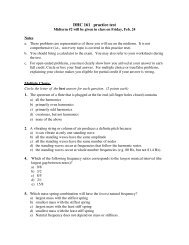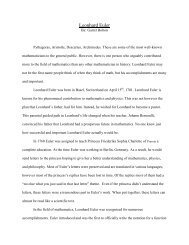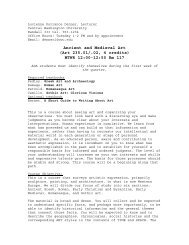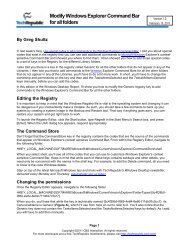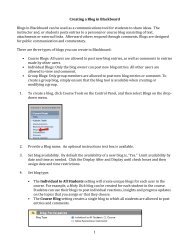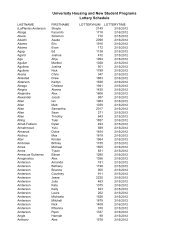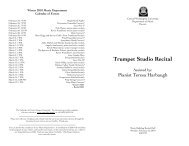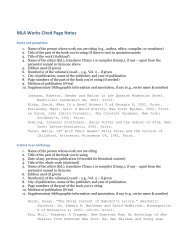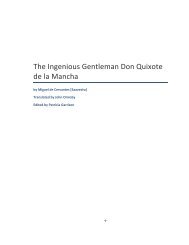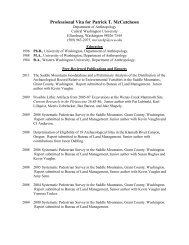THE COURAGE OF TURTLES - Central Washington University
THE COURAGE OF TURTLES - Central Washington University
THE COURAGE OF TURTLES - Central Washington University
Create successful ePaper yourself
Turn your PDF publications into a flip-book with our unique Google optimized e-Paper software.
Orwell 13<br />
This is a parody, but not a very gross one. Exhibit (3), above, for instance,<br />
contains several patches of the same kind of English. It will be seen that I have not<br />
made a full translation. The beginning and ending of the sentence follow the original<br />
meaning fairly closely, but in the middle the concrete illustrations—race, battle,<br />
bread—dissolve into the vague phrase "success or failure in competitive activities." This<br />
had to be so, because no modern writer of the kind I am discussing—no one capable of<br />
using phrases like "objective consideration of contemporary phenomena"—would ever<br />
tabulate his thoughts in that precise and detailed way. The whole tendency of modern<br />
prose is away from concreteness. Now analyse these two sentences a little more closely.<br />
The first contains forty-nine words but only sixty syllables, and all its words are those of<br />
everyday life. The second contains thirty-eight words of ninety syllables: eighteen of its<br />
words are from Latin roots, and one from Greek. The first sentence contains six vivid<br />
images, and only one phrase ("time and chance") that could be called vague. The second<br />
contains not a single fresh, arresting phrase, and in spite of its ninety syllables it gives<br />
only a shortened version of the meaning contained in the first. Yet without a doubt it is<br />
the second kind of sentence that is gaining ground in modern English. I do not want to<br />
exaggerate. This kind of writing is not yet universal, and outcrops of simplicity will<br />
occur here and there in the worst-written page. Still, if you or I were told to write a few<br />
lines on the uncertainty of human fortunes, we should probably come much nearer to<br />
my imaginary sentence than to the one from Ecclesiastes.<br />
As I have tried to show, modern writing at its worst does not 12 consist in picking out<br />
words for the sake of their meaning and inventing images in order to make the meaning<br />
clearer. It consists in gumming together long strips of words which have already been<br />
set in order by someone else, and making the results presentable by sheer humbug. The<br />
attraction of this way of writing is that it is easy. It is easier—even quicker, once you<br />
have the habit—to say In my opinion it is not an unjustifiable assumption that than to<br />
say I think. If you use ready-made phrases, you not only don't have to hunt about for<br />
words; you also don't have to bother with the rhythms of your sentences, since these<br />
phrases are generally so arranged as to be more or less euphonious. When you are<br />
composing in a hurry—when you are dictating to a stenographer, for instance, or making<br />
a public speech—it is natural to fall into a pretentious, Latinized style. Tags like a<br />
consideration which we should do well to bear in mind or a conclusion to which all of<br />
us would readily assent will save many a sentence from coming down with a bump. By<br />
using stale metaphors, similes and idioms, you save much mental effort, at the cost of<br />
leaving your meaning vague, not only for your reader but for yourself. This is the<br />
significance of mixed metaphors. The sole aim of a metaphor is to call up a visual image.<br />
When these images clash—as in The Fascist octopus has sung its swan song, the<br />
jackboot is thrown into the melting pot—it can be taken as certain that the writer is not<br />
seeing a mental image of the objects he is naming; in other words he is not really<br />
thinking. Look again at the examples I gave at the beginning of this essay. Professor



